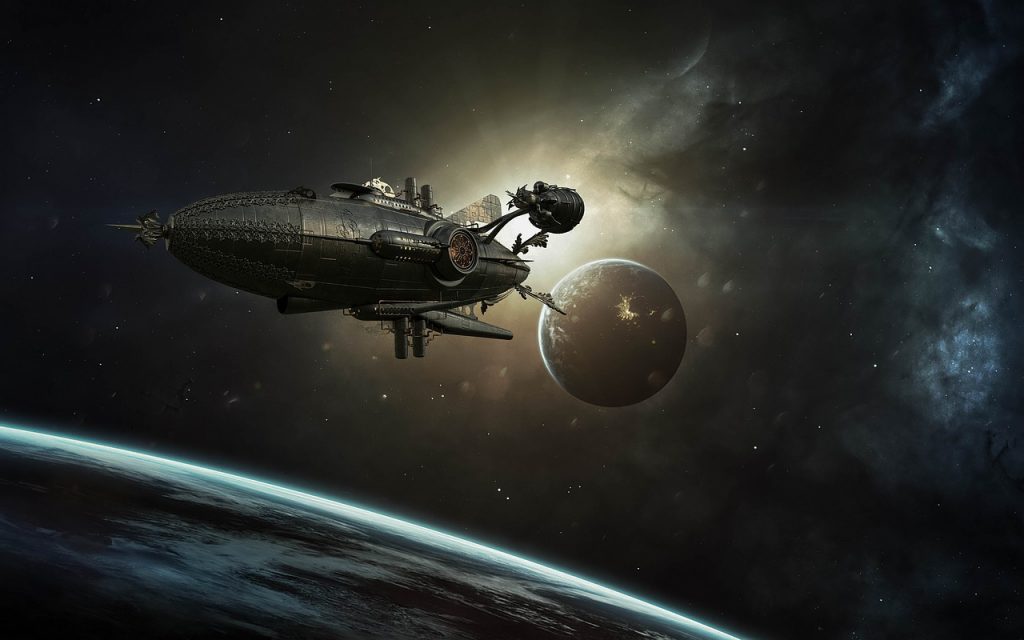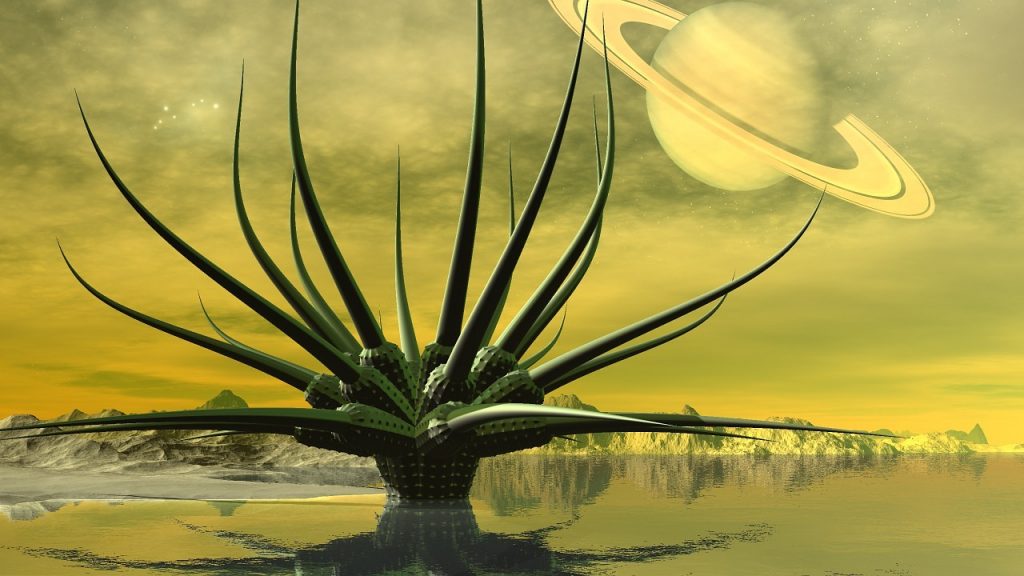What is science fiction?
Science fiction, abbreviation SF or sci-fi, is a form of fiction that deals principally with the impact of actual or imagined science upon society or individuals. Science fiction is a genre of speculative fiction that usually deals with imaginative and futuristic concepts such as advanced science and technology, space exploration, time travel, parallel universes, and extraterrestrial life.

In sci-fi realms, we use terms like “hard” versus “soft” fiction.
Hard sci-fi gets into the “nuts and bolts” of whatever science appears in the story. Hard sci-fi stories often deal with some aspect of astronomy, biology, chemistry, or physics.
Soft sci-fi is more concerned with the societal and human aspects of the story, spending less time on the technical or scientific. These stories often feature the “softer” sciences like anthropology and psychology.
Although, this may be an oversimplification. (If you want to further explore this distinction, check out Tor.com article Ten Authors on the Hard vs. Soft Science Fiction Debate). But it helps to illustrate the point I’m making here.
Let’s look at some of the steps you can take in your quest to write a good, or even great, sci-fi novel or novella.
15 Tips to Help Navigate Some of the Pitfalls of Writing Sci-Fi.
- Writing a unique sci-fi story is about finding your own voice. There is a saying that ‘there are no new stories, only old ones with different words.’ So, writing a creative science fiction story is more about the way you take the ideas and present them and less about trying to create the weirdest new world you can imagine.
Candace Bacon of Hobby Lark in “How to Write a Science Fiction Story” explains this point more clearly. “Let’s consider, dystopian, post-apocalyptic stories have been around forever. What makes the Hunger Games series by Suzanne Collins such a good story? She took the concept of an oppressive government (like 1984) and blended it with Greek myths and the idea of gladiatorial games. She put it in a more futuristic setting and added the modern-day voyeuristic, fashion victim themes. So, none of the ideas are really new. What makes it unique is how Collins molded the elements together.”
Do you prefer hard or soft sci-fi? Dystopian stories? Time-traveling elements? Do you enjoy battle scenes? Do you love the social dynamics between characters? A romance? A love triangle, perhaps? What type of settings do you prefer (i.e. Earth, another planet, another realm)?
2. Utilize the elements and mechanics of good writing: a specific setting, character development, plot (central conflict, complications, climactic events, resolution), themes, and structure. Pick a tense (typically past or present) and stick with it through the whole story. Consider the point or points of view that might work well for the story you’ve chosen.
3. Consider why you chose sci-fi. What is it that you love about this genre? What are your favorite science fiction books or shows? Consider what you enjoy most. There’s a wealth of materials to gain inspiration from, not least of all your fellow writers and directors. Sci-fi is an amazingly broad genre (covering everything from post-apocalyptic fiction to sweeping space operas), but it also helps satisfy some of that curiosity, feed that wonder, and fuel our imaginations.
4. If you don’t have a problem, you don’t have a story. Period. That may sound cliché, but it is the truth of all fiction. It is irrefutably true. Consider any TV show (yes, even cartoons) or any movie, they all have one thing in common and that is there is a problem that needs to be solved (for better or for worse). The problem should show up early on in your story and compound with added conflicts that get in the way of the resolution.
In his book Immediate Fiction: A Complete Writing Course, author and writing coach, Jerry Cleaver “expresses this idea in simple mathematical terms: Want + obstacle = conflict.
If you want to write a good science fiction novel, you must create obstacles for your characters. You might not want to do this. After all, you like your characters. You created them from nothing. They are your literary offspring. Why would you want to see them suffer? But you need to do it. They need to face challenges at every turn. It is through these challenges that your characters grow and change.”
To put it more simply, consider the adage: “if your characters are having a good time, then your readers are not.”
5. Ask questions. Science Fiction writers ask questions. “What if” or “what would happen if” have been the seeds of many stories. Dune starts with “what if humans traveled through space without computers?” The book and Netflix series Altered Carbon address the question “what if humans could upload our minds to become immortal?” Try to come up with your own questions to ask. But, of course, the most popular in the genre is “what if we’re not alone?”
6. Read, read, read. Read a lot of sci-fi. Look for current trends in new releases of science fiction books, movies, and shows. Check out Wired‘s list of “25 of the Best Sci-Fi Books Everyone Should Read.”
7. At first, Keep it short. Before attempting to write your first sci-fi novel, write a short story. In a novel, the writer can take the time to develop the plot, characters, background, and story. With short stories, space is limited. The writer needs to get the story rolling and can’t take the time for scenic detours.
8. Descriptions should be limited. You will start losing the audience’s attention if you go into lengthy descriptions. This goes for character descriptions as well.
9. Establish the setting and the characters, and then move on to the problem. The plot is what the readers will care about most. Keep the number of characters to a minimum. Too many characters will make the story too complex and the readers won’t be able to tell them apart.
10. Don’t let science overwhelm your plot. Have a rudimentary grasp of the science you will be discussing. However, do not let science get in the way of the plot. Stick to general descriptions of the world or sci-fi elements of the story. Don’t get too technical or you are going to alienate too much of your audience. Mainstream readers are not going to be physics experts or care to know the exact mechanics of how your imaginary world works.
11. Consider your readers. Sci-fi readers are diverse and creative. Some sci-fi readers will gladly consume books across the entire spectrum, while others prefer to stay within a narrower lane. In SFWA’s article “Who Reads Sci-Fi?” in 2014 Google claimed that 57% of sci-fi readers are male. However, nowadays, I believe that there is a much more even divide amongst the sexes and those who identify as nonbinary. Sci-Fi used to be a male-dominated genre, both for authors and readers, but no more.
12. Write an amazing climax. What is a climax? To put it simply, the climax is the most important part of your story. Research tells us that the climax will resonate long after with your readers. So, make sure that it is not only well-crafted but astounding. Check out The Write Practice’s “Climax of a Story: Definition, Examples, and Writing Tips.”
13. Worldbuilding is important to do before you begin writing. It is helpful to map out the settings, races or species, and the daily life of characters before you begin writing. Undoubtedly your characters will be moving from zone-to-zone or from planet to planet. It is helpful to plot out the atmosphere, the typography, and/or modes of travel beforehand. You can keep the ideas or even the world complex but keep the language simple and accessible.
14. Consistency is key. Whatever rules you establish for your worlds must remain consistent throughout the text.
15. Character development must drive the plot. This is important in every novel; it’s even more important in a series. Even if your character is from an intergalactic race, you must strive to create characters that are believable and relatable. Your characters do not have to be human, but they must be able to relate to the human condition.
But how do you make something inhuman relatable to humans? It’s simple: emotions. By incorporating human emotions in your characters, you will accomplish this goal. To stay connected to a story, we must care about the characters— or at least the main character— on some level. We must understand, and maybe even share, their hopes, successes, fears, and disappointments.

Good science fiction has been used not just to imagine what the world of tomorrow would look like, but also how it would feel to live and interact with people in that world. That’s where you, a skilled science fiction writer, step in and craft a world that’s both realistic and insightful based on your observations of the present. Hopefully, these top 15 tips for writing sci-fi will help you create the next great sci-fi short story or novel!
Now, get out there and write. I can’t wait to see what you come up with! For more inspiration, check out my book list and other writing resources at Teaching With Poetry.
